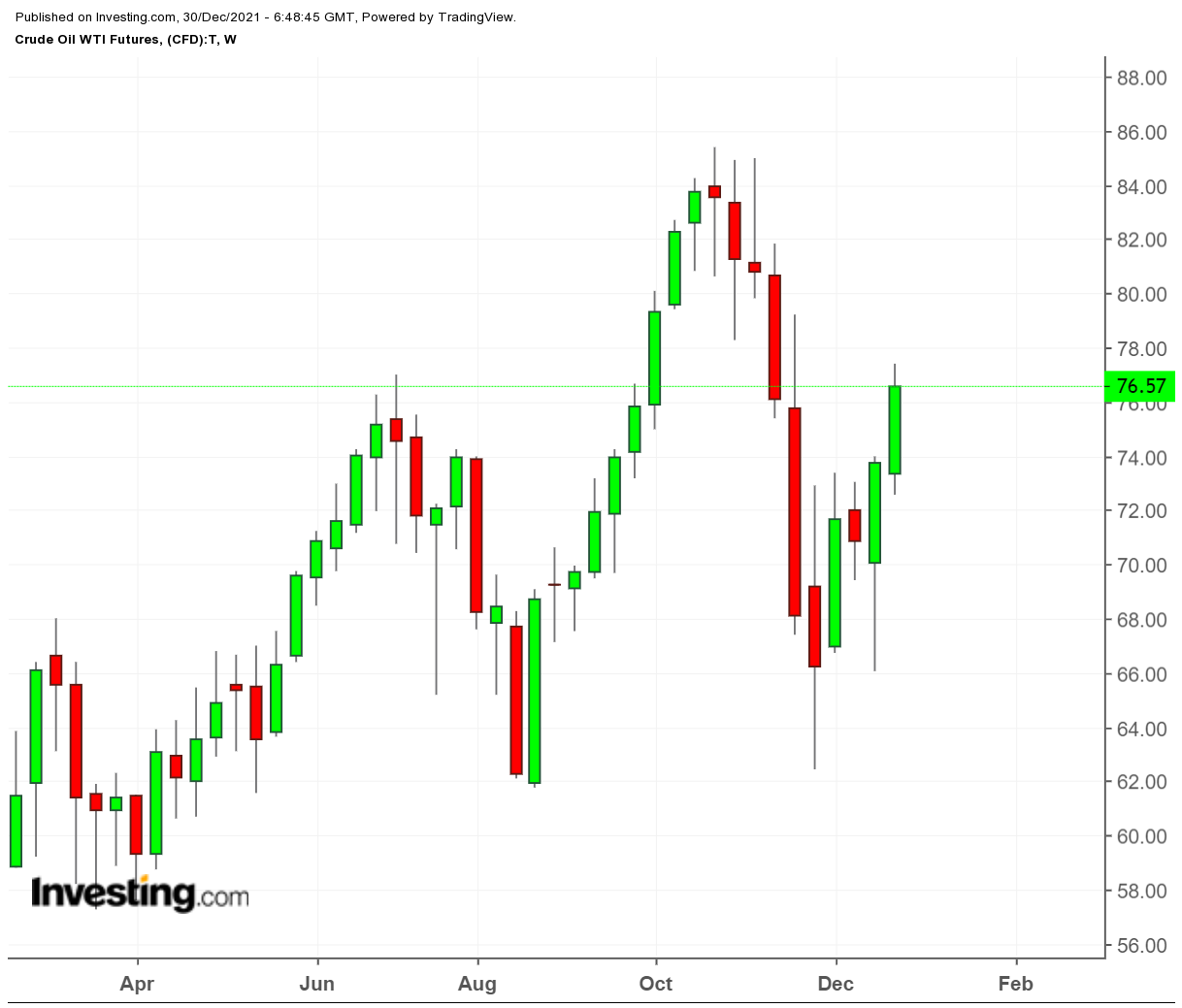AI-picked stocks now up 150%+; an 111% outperformance vs. the S&P 500
As we start the new year, here's a look at some of the issues that could be the most important drivers of oil prices in 2022.
We have already seen forecasts for 2022 that range from moderate drops to price increases into the triple digits, so we start the year with the typical high levels of uncertainty for the future.

Here are 13 key issues to watch in the new year that might guide us regarding oil price direction as events unfold. Seven represent upward price catalysts, while an additional six imply downward pressure.
7 Things That Could Push Prices Higher
1. Russian Belligerence
Europe and the U.S. are concerned that Russia may exert further military influence over Ukraine, and this has led to talk of potential oil and gas sanctions.
Amidst this situation, it must be noted that Russia is the primary supplier of natural gas for Europe, which it has been curtailing. Less Russian natural gas in Europe leads to greater use of oil as a power generating fuel.
2. Saudi Instability
King Salman of Saudi Arabia will turn 86 in 2022. Any change in leadership in Saudi Arabia could lead to uncertainty and anxiety in the oil market. If there is a change in leadership, prices would likely rise, but the duration and intensity of the rise would depend upon the situation on the ground.
3. Chinese Expansionism
There is always a possibility that China may try to exert its influence over Taiwan or create a hegemony in the South China Sea. This could threaten oil supply lines and raise significant demand issues.
4. U.S. Environmental Regulations And Infrastructure Legislation
American environmental regulations are often seen as a burden on U.S. exploration and production. The 2022 midterm elections will take place in November and could influence the severity of regulations and their implementation.
5. U.S. Oil Production Numbers
2021 saw some growth in U.S. production, but it is still below pre-pandemic output. Many U.S. producers are increasing spending, but we are not yet seeing the kind of financial commitment from producers necessary to return to 2019 levels of production. The price of oil will rise in 2022 if producers remain hesitant and U.S. economic growth and demand continue to increase.
6. Coronavirus
There are growing indications that the Omicron variant is less severe, which could lead to greater economic growth and the further resumption of global travel.
7. Inflation
This has impacted oil prices in 2021. The questions are how much it will push up oil prices in 2022 and for how long.
6 Things That Could Push Prices Lower
1. Diplomatic Relations With Iran
If the U.S. relaxes sanctions against Iran, the increase to global oil supplies could initially be as high as 850,000 bpd with further expansion expected. That's according to S&P Global Platts. Even more significant, the sentiment within the oil market would send prices lower.
2. Biden Relaxes Regulations
Just as harsher U.S. regulations could mean higher oil prices, relaxed regulations could lead to more production and lower prices. Again, the November 2022 midterm elections in the U.S. will likely impact how the government chooses to create and enforce regulations.
3. Republican Win In November U.S. Elections
Generally, the Republicans are considered friendlier towards oil production. A convincing Republican win might signal to some oil producers that the environment is becoming more conducive to them producing additional oil and gas.
4. U.S. Production And Exploration Growth
Prices will fall if companies do decide to spend more on production. Prices will drop especially if production growth outpaces demand growth. There are some indications that production growth in 2022 could come from producers that are not publicly traded. One key indicator to watch is the financing of these firms.
5. OPEC+
These days, we cannot be confident about what decision OPEC+ will make before each monthly meeting. This introduces an element of instability to the market. There is always the possibility that the cooperation between OPEC and its non-OPEC partners could fall apart leading to unregulated production levels, especially when a new production agreement needs to be negotiated in the spring.
6. China’s Oil Imports
China could decide to halt or curb its oil imports at any time. Currently, China is by far the largest oil importer in the world, which gives the country great influence over the market.
China also has a tremendous amount of oil in inventory—both public and private—so it has the ability to curtail its imports for a time without harming its own economy. Such a decision, whether deemed necessary by Beijing or employed as an economic tactic, would hurt the price of oil significantly.
